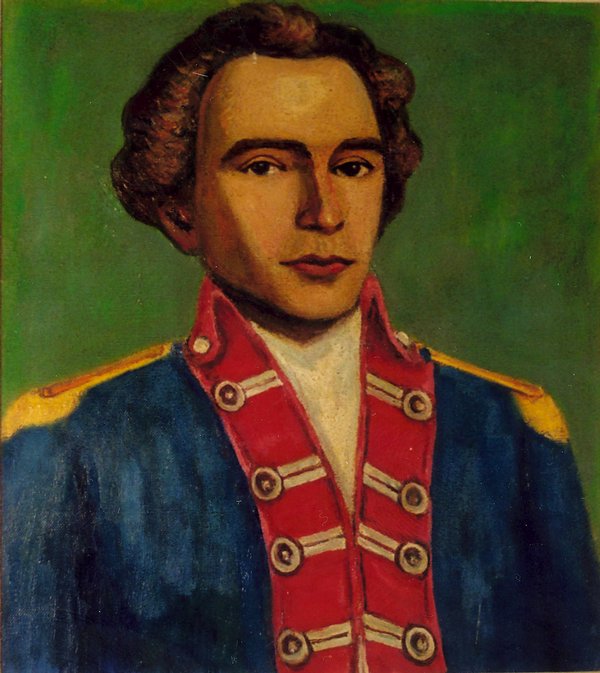Chapter One: Things Fall Apart
Crazymachines
Banned
Peccavi: A History of The United States
Chapter One: Things fall apart
"GOOD LORD, WHAT IS HAPPENING IN THERE!?"
-Thomas Jefferson, upon seeing a fistfight break out among delegates of the US Constitutional Convention
1787: The Federalists, Led by Alexander Hamilton, lead the call for a new governing document for The United States in Congress Assembled. However, Hamilton, displaying a remarkable lack of tact, winds up alienating the Anti-Federalists even before the Constitutional Convention can convene. As the delegates assemble in Philadelphia, both sides quickly became unable to agree on a path forward. The Federalists are simply unable to convince their opponents to abandon the Articles of Confederation, who are skeptical of Hamilton's machinations. George Washington, as President of the Convention, does his best to calm the flames of passion, but the stress and overwhelming July heat take their toll on him. In late July after attempting to resolve yet another spirited debate, Washington suffers a major stroke. While surviving the incident, Washington is seriously physically impaired, and withdraws from the convention to rest up and recover from the incident.
Without his presence, the Constitutional Convention quickly deteriorates from a place of serious debate into a glorified shouting match. The Anti-Federalists walk out soon after and spread word of alleged Federalist plans to pave the way “to a new and odious form of tyranny”. Nevertheless, the Federalists push on, and without major opposition the Convention approves a new constitution.
1788/89: The publication of the new document elicits both approval and outrage across the country, and state legislatures across the country take up the document for debate, some ratifying the new Constitution, and others choosing to reject it. The perceived anti-slavery nature of the proposed constitution causes the legislatures of Virginia and South Carolina to refuse to even bring the document to the floor for debate. Under the proposed document, representation in the national legislature is allocated proportional to each states free population, specifically excluding slaves and indentured servants. This is extremely unpopular with southern delegates, where forty percent of the population is enslaved; their exclusion seriously decreases the south's potential representation in the House and Electoral College.
On November 21st, 1789, Georgia becomes the eighth state to ratify the Constitution, leaving New Hampshire, Rhode Island, Virginia, and both Carolina's under the old Articles. Unfortunately the proposed Federalist constitution stipulates that nine out of thirteen states are required to ratify the document for it to come into effect.
1790: The New Hampshire Legislature ratifies the Federalist Constitution on February 29th, after months of intensive negotiations, horse trading, and concessions to the anti federalists. With the nine state threshold having finally been met, the Constitution enters into force within the ratifying states. The first United States Congress convenes on March 3, 1790, passing twelve articles of amendment to the Constitution and sending them to the states for ratification; eight are eventually ratified and collectively become known as the Bill of Rights. John Adams – an American statesman, attorney, diplomat, writer, and prominent leader of the revolution – is elected in a landslide as the first President of the United States. This is in no small part due to Rhode Island, North Carolina, South Carolina, and Virginia refusing to ratify the constitution, and thus being ineligible to participate in the election.

John Adams, First President of The United States
Chapter One: Things fall apart
"GOOD LORD, WHAT IS HAPPENING IN THERE!?"
-Thomas Jefferson, upon seeing a fistfight break out among delegates of the US Constitutional Convention
1787: The Federalists, Led by Alexander Hamilton, lead the call for a new governing document for The United States in Congress Assembled. However, Hamilton, displaying a remarkable lack of tact, winds up alienating the Anti-Federalists even before the Constitutional Convention can convene. As the delegates assemble in Philadelphia, both sides quickly became unable to agree on a path forward. The Federalists are simply unable to convince their opponents to abandon the Articles of Confederation, who are skeptical of Hamilton's machinations. George Washington, as President of the Convention, does his best to calm the flames of passion, but the stress and overwhelming July heat take their toll on him. In late July after attempting to resolve yet another spirited debate, Washington suffers a major stroke. While surviving the incident, Washington is seriously physically impaired, and withdraws from the convention to rest up and recover from the incident.
Without his presence, the Constitutional Convention quickly deteriorates from a place of serious debate into a glorified shouting match. The Anti-Federalists walk out soon after and spread word of alleged Federalist plans to pave the way “to a new and odious form of tyranny”. Nevertheless, the Federalists push on, and without major opposition the Convention approves a new constitution.
1788/89: The publication of the new document elicits both approval and outrage across the country, and state legislatures across the country take up the document for debate, some ratifying the new Constitution, and others choosing to reject it. The perceived anti-slavery nature of the proposed constitution causes the legislatures of Virginia and South Carolina to refuse to even bring the document to the floor for debate. Under the proposed document, representation in the national legislature is allocated proportional to each states free population, specifically excluding slaves and indentured servants. This is extremely unpopular with southern delegates, where forty percent of the population is enslaved; their exclusion seriously decreases the south's potential representation in the House and Electoral College.
On November 21st, 1789, Georgia becomes the eighth state to ratify the Constitution, leaving New Hampshire, Rhode Island, Virginia, and both Carolina's under the old Articles. Unfortunately the proposed Federalist constitution stipulates that nine out of thirteen states are required to ratify the document for it to come into effect.
1790: The New Hampshire Legislature ratifies the Federalist Constitution on February 29th, after months of intensive negotiations, horse trading, and concessions to the anti federalists. With the nine state threshold having finally been met, the Constitution enters into force within the ratifying states. The first United States Congress convenes on March 3, 1790, passing twelve articles of amendment to the Constitution and sending them to the states for ratification; eight are eventually ratified and collectively become known as the Bill of Rights. John Adams – an American statesman, attorney, diplomat, writer, and prominent leader of the revolution – is elected in a landslide as the first President of the United States. This is in no small part due to Rhode Island, North Carolina, South Carolina, and Virginia refusing to ratify the constitution, and thus being ineligible to participate in the election.

John Adams, First President of The United States
On April 16th, the North Carolina Legislature votes overwhelmingly to secede from the United States, publishing 'A Declaration of the Immediate Causes Which Induce and Justify the Secession of North Carolina from these United States in Congress Assembled' in explanation and support of their decision. The document cites “The tyrannical and illegitimate nature of that Hamiltonian rag masquerading as a constitution,” claiming the document tramples over the rights of individual states, is hostile to the property rights of slaveholders, and that the extensive powers it grants to the presidency set the stage for American monarchy.
North Carolina’s move to secede is soon followed by South Carolina, whose Legislature passes an ordinance of session on the 6th of May.
Virginian politicians, somewhat more divided on the issue, decide to leave the matter of secession up to the people of Virginia, with 51.5% of eligible voters voting ‘Yes’ in a referendum on June 19th. Even minuscule Rhode Island briefly declares its separation from the union, however, food and supply shortages soon become crippling within just a few months, and a desperate Providence finally agrees to the ratification of the constitution by the end of the year.
George Washington passes away on July 3rd in Mount Vernon, having never fully recovered from his stroke in 1787. During the last hours of his life, he is accompanied by friends, family, and by many of his political acquaintances. His last recorded words are “I am just going. It has been an honor, not to mention a privilege, to know you all. God save these United States, for I cannot.”
~~~

August 1st, 1790
Philadelphia, Pennsylvania, United States of America.
It was a warm day, Congress was in recess, and it was the perfect time to sit and read by the window and enjoy a quick lunch, a rare moment of peace amidst the chaos of politics. Alexander Hamilton couldn't help but feel a sense of pride wash over him as he reflected on his recent election to the Vice Presidency. It was a position of great influence and power, one that he had worked tirelessly to achieve. He knew that his intellect and ambition alone had brought him to this point, but he couldn't help but feel a twinge of unease. The Vice Presidency was not without its challenges, and Hamilton knew that he would have to navigate the murky waters of Philadelphia politics with care if he wanted to truly succeed. But for now, he allowed himself a moment of satisfaction, knowing that his hard work and determination had paid off.
Just as he was about to take another sip of his beverage, his office door burst open as a frantic messenger rushed in. "Mr. Hamilton, his Excellency requests your presence in the President's office" the messenger exclaimed breathlessly, panting heavily. Hamilton quickly rose to his feet, setting down his half eaten scone with a sigh. It seemed there was never a moment of rest in Independence Hall. He straightened his jacket, brushing off a few crumbs, and followed the messenger out of the room, mentally preparing for whatever urgent matter awaited him in the President's office.
******
Alexander Hamilton paced the room as President John Adams, seated at the desk, eyed him warily. "I cannot support a tax on whiskey," Adams said firmly. "It will only lead to more unrest and division among our populace, and it risks the possibility of even further disunion." Hamilton shook his head, frustration mounting. "But we need the revenue," he argued. "And a tax on whiskey is by far the most practical solution. The farmers will have to pay their fair share." Adams leaned back in his chair, his expression skeptical. "And what about protests?" he countered. "You know just how strongly some people will feel about this. Things could very easily turn violent." Hamilton's jaw clenched, his eyes narrowing. "We have a duty to pay off our debts, your Excellency. it is the only way to ensure the stability of our young nation" he said firmly. "We must do what is necessary to ensure a strong, centralized government." Adams nodded slowly, his mind racing with the implications of what Hamilton was saying. He knew that whatever the method, paying off the debts the states had accrued during the Revolutionary War would be a heavy undertaking,
one that would indeed require some sacrifices...
[I would like to thank @Mooze17, @Scrivener, @Murica1776, and many others for helping shape my ideas for this timeline, and just being generally supportive. thanks guys!]
Last edited:



